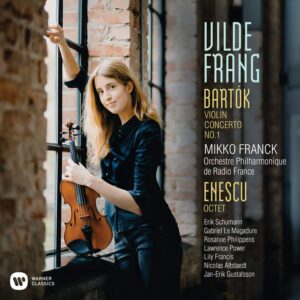The octet of musical acquaintances on this disc, who were all lured to magnificent Schloss Elmau—a luxury spa-hotel right beneath the Bavarian Alps with its own renown music series—is a who’s who of the young generation’s finest musicians. Apart from front-woman Vilde Frang, there’s Gabriel Le Magadure, the Quatuor Ébène’s playfully-delicate second violinist. There’s Lawrence Power, the great British violist, Nicolas Altstaedt the conducting cellist, and American Lily Francis, whom I remember well from the 2009 ARD Competition where she stood out for her “refreshing absence of artifice” and standard-setting interpretation of a commissioned piece by Poul Ruders. Erik Schumann, Rosanne Philippens, and Jan-Erik Gustafsson complete the eight-some.
Look Mom, no conductor! What a beguiling performance they muster in the Enescu Octet, a work that needs to have attention paid to it only to then pay it back many times over. Usually, it’s performed by ensembles with a conductor—but these players are plenty in tune with each other so as not to need one. The knottiness of the triple-fugue receives a human face in light of the meticulously skillful ease with which it is dispatched. For all the nearly overwhelming density of the finale, the players manage to imbue it with enough clarity and structure to let some light shine in. If the reference was hitherto the Academy of St. Martin in the Fields Chamber Ensemble (Chandos), it is handily overtaken by this one, which makes you not just appreciate the work, but cherish it: What is it with octets and teenagers, you might wonder, seeing that Enescu was, at 19, only marginally older than Mendelssohn when writing this precocious masterpiece.
The nominal main course on the disc is Vilde Frang’s fine Bartók First Violin Concerto, performed with the Orchestre Philharmonique de Radio France under Mikko Franck. It essentially becomes a course of two amuse gueules; impeccably played by Frang and with neat brassy intensity by the orchestra. And yet, the result sounds perhaps a smidgen too neat. Amid a glut of recent “great” recordings—Arabella Steinbacher, James Ehnes, Christian Tetzlaff, Isabelle Faust—this doesn’t absolutely demand our ears, although it will certainly still delight them. The main reason for the disc remains the Octet—and that’s more than enough reason to grab a copy.
































